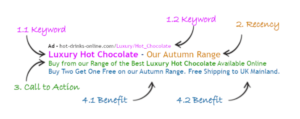How to Improve Ad Relevance Score

Deep Dive: How to Improve Ad Relevance – Our 6 Top Tips!
Do you want to boost your ad visibility, overall Quality Score and see a better click-through rate? If so, it’s time to take a deep dive into ad relevance!
If you’re not sure where to begin, worry not. This article covers how to improve your ad relevance with simple steps. So first things first, let’s start with the basics.
How to Improve Ad Relevance? Follow our Top 6 Steps for Sucess!
You might also want to look at these resources on Quality Score:
- How Quality Score Works
- 10 Ways to Improve Your Google Ads Quality Score
- How to Improve Ad Relevance Score
What Does Ad Relevance Mean?
Ad relevance is a status that measures how relevant your ad is to the search that triggered it. For example, if a user searches and your ad shows up, how relevant your ad is to that search term determines your ad relevance score.
Google’s Quality Score metrics will show you the status of your ad relevance, which will fall under one of the following:
- “Below average”
- “Average”
- “Above average”
If you find that your ads have a “below average” status, it’s important to consider why your ads aren’t aligning with the users’ searches.
Where Is Ad Relevance Shown?
Discover the ad relevance status for your keywords by heading to the Keywords tab on your Google Ads Account. From there, click the columns button and under the Quality Score tab you’ll find the option to add a column for Ad Relevance.
Why is Ad Relevance Important?
Ad relevance is important because it is one of the key factors that can improve your Quality Score. When you boost your Quality Score, you’re likely to see a better ad rank, without having to spend any more money (lower cost-per-click).
It is important to note that even if your Quality Score is good, you can still have low ad relevance (and vice versa).
This is because Quality Score is determined by multiple factors, including your ads, keywords, and landing pages. Check out our guide to Quality Score here for more information and guidance.
6 Ways to Improve Your Ad Relevance
It can be tricky to know where to begin, so we’ve put together some helpful steps to help you improve your ad relevance.
1) Group Your Keywords Carefully
Your ads may have “below average” status because your keywords aren’t relevant enough, or because your keyword groups cover too many topics.
It is essential to group your keywords carefully and to be very specific. Although Google encourages users to group multiple keywords together, an overload of keywords in one group can make it harder to achieve a message match.
Grouping 10-20 keywords together means you’re likely to end up with irrelevant keywords taking users to an ad. So, how can you avoid this? The answer brings us onto SKAGs.
2) Start Using SKAGs
SKAGs are single keyword ad groups that ensure only one keyword triggers a particular advert.
This makes message matching much easier, as you can work on making your ad highly specific to your
chosen keyword.
If you switch to single keyword ad groups, you’re likely to see a spike in click-through rate because your ads will be more relevant to search terms.
You can also test which ads are working best by creating multiple ads for one group. Google will automatically rotate ads within one ad group and keep showing users your best performing ad.
3) Include Keywords in Your Ad Text
To achieve the perfect message match, you’ll want to ensure your keyword is included throughout your ad, as seen below.
- 1.1 – Including your keyword in the ad’s main headline.
- 1.2 – If it fits, include it in the paths for your Display URL too.
- 2 – Include indicators that the ads are up to date.
- 3 – Include a call to action, directing the user to convert.
- 4.1 – Offers help to seal the deal when comparing against your competitors.
- 4.2 – Showing USPs improves your click through rate and conversion rate.
For the best results, we recommend including your keyword in your ad headline, and if possible in the paths for your Display URL.
Your ad description can also feature your keyword and a strong call-to-action (CTA) which will encourage users to click-through.
For example, “get your free sample today” is a better CTA than “browse here”.
4) Keep Ads Simple and to the Point
Keeping your ads simple is one of the easiest ways to improve your ad relevance status. Don’t try to complicate your ads by making them relevant to lots of potential searches. The more specific you are in your ad copy and your build, the greater the chance is that your ad will match a user query.
The closer your message match is, the higher your click-through rate and conversions will be. If your ad closely matches what a user is searching for, the more likely it is that they will be converted into a customer.
5) Send Traffic to Relevant Landing Pages
Once you have worked on improving your ads, it’s time to look at your landing pages. To start capturing traffic on relevant landing pages, it is essential to ensure your keywords from your ad are strategically featured on your landing page.
For example, if your keyword is “Star Wars board game”, your ad should also feature this exact keyword phrase and it should also be included in the text of your landing page.
6) Exclude Less Relevant Traffic to Your Ads
Not all traffic is good traffic, and the good news is, you can exclude less relevant traffic by targeting ads with more specific keywords, or setting up negative keywords to block less relevant traffic.
For example, if you are selling books and using the phrase match keyword “harry potter books”, you might show up for terms like “where to buy harry potter books”, but also “what order are the harry potter books in”. One of those terms is relevant, and might lead to a sale, the other is partially relevant but far less likely to convert.
We hope you have found our guide useful and now have a better understanding of how to improve ad relevance.
Get Your Free Google Ads Audit from PPC Geeks
Start improving your Google Ads campaigns today with our 100% free Google Ads audit and find out how your company’s Google Ads account stacks up against the best in the business!
Author
Search Blog
Free PPC Audit
Subscribe to our Newsletter
The Voices of Our Success: Your Words, Our Pride
Don't just take our word for it. With over 100+ five-star reviews, we let our work-and our satisfied clients-speak for us.
"We have been working with PPC Geeks for around 6 months and have found Mark and the team to be very impressive. Having worked with a few companies in this and similar sectors, I rate PPC Geeks as the strongest I have come across. They have taken time to understand our business, our market and competitors and supported us to devise a strategy to generate business. I value the expertise Mark and his team provide and trust them to make the best recommendations for the long-term."
~ Just Go, Alasdair Anderson

